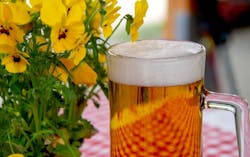Grand Rapids, Michigan’s John Ball Zoo and Brewery Vivant teamed up to release a beer called "JBZ."
JBZ is meant to highlight the zoo's conservation and sustainability efforts, according to the zoo, reported WZZM. Brewery Vivant said it would make a donation to water conservation and sustainability efforts as well.
"As a company focused on sustainability, we have been impressed with the initiatives that the John Ball Zoo team has been implementing and we are excited to draw attention to the importance of water quality for our community through our partnership," said Brewery Vivant President Kris Spaulding said in a press release. "It was a natural fit to work together."
The JBZ beer will be on draft starting Jul. 9 at various locations at the John Ball Zoo, as well as Brewery Vivant, located at 925 Cherry St. SE in Grand Rapids. The beer will be packaged in 16 oz cans, which will be available for takeout through Brewery Vivant and John Ball Zoo retail outlets later this summer.
“Creating such a partnership with Brewery Vivant made the most sense given our shared values in conservation, sustainability, and community. Creating such a program brings awareness to generations that might not be as knowledgeable about the zoo's conservation efforts,” said John Ball Zoo CEO Peter D’Arienzo. “Together, we hope this partnership brings greater awareness not only to the importance of water quality for wildlife but also for the community.”
The John Ball Zoo designed and built a habitat which is SITES centered. The Sustainable SITES Initiative is a rating system for developing sustainable landscapes, similar to LEED, according to the zoo. The zoo’s goal is to reach SITES' Gold certification by summer 2020, reported WZZM. The certification would make John Ball the first zoo in the country to receive it.
In fact, the zoo's meerkat habitat was built to SITES certification. This has provided key benefits, including: reducing water demand, filtration and storm water runoff, while providing wildlife habitat, reducing energy consumption, improving air quality, improving human health, and increasing outdoor recreation opportunities.
This is achieved through manual irrigation on an as-needed basis using 100% native plantings. Some of the plants are growing from locally harvested seeds from Plaster Creek Stewards, added the zoo. John Ball Zoo is also utilizing rain gardens and leaching basins for storm water. The zoo installed a green roof and solar panels on the canopy to offset outdoor lighting needs. There are also no CO2 emissions through the use of a special ventilation unit.
Another major sustainability project the zoo is working on is achieving Living Build Challenge (LBC) certification, which is the world’s most rigorous green building standard. This means the zoo is working to reuse, salvage or recycle matters from the former guest services building which has been leveled. None of the materials can end up in a landfill as well.
This project at John Ball Zoo is currently the first and only commercially registered Living Building Challenge project in Michigan.
